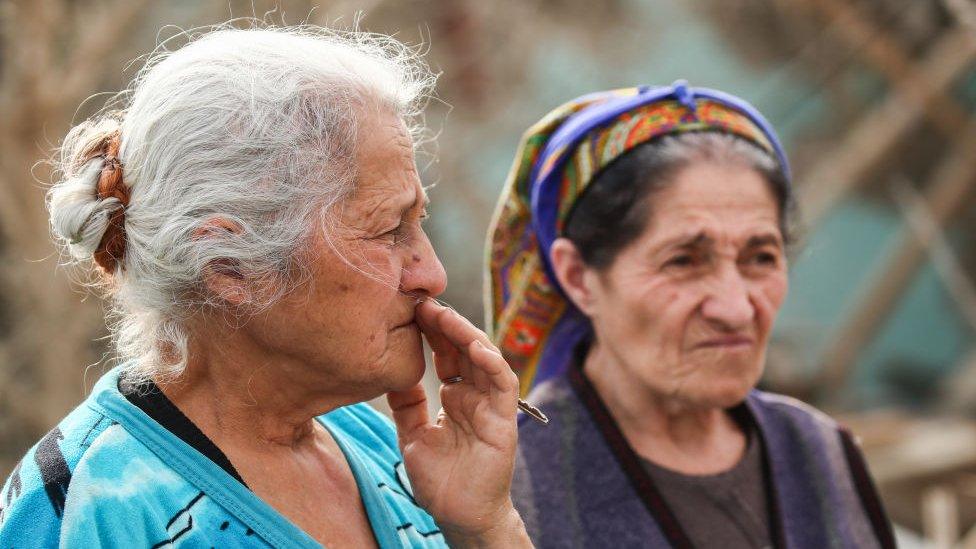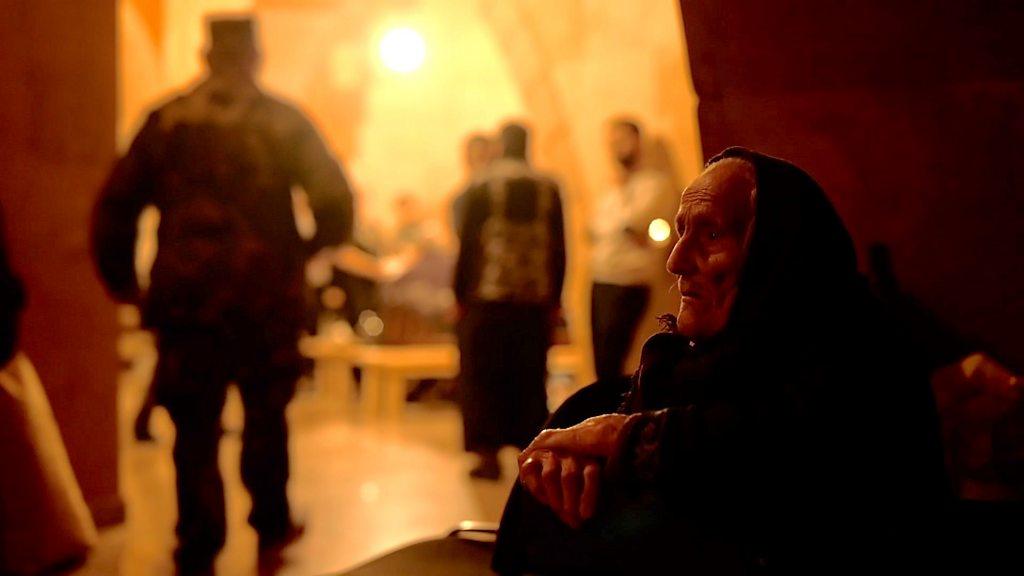Nagorno-Karabakh: Azerbaijan 'takes key town' in Armenia conflict
- Published
'We are getting territory back by force'
Azerbaijan has taken a key town in the separatist Nagorno-Karabakh region, according to the country's president.
Ilham Aliyev announced in a televised address on Sunday that Azerbaijani forces had gained control of Shusha, known as Shushi in Armenian.
Armenia, however, denied the town's loss and said fighting was ongoing.
Taking the strategically important town would be a major victory for Azerbaijan in the ongoing conflict over the disputed territory.
Nagorno-Karabakh is internationally recognised as part of Azerbaijan, but is governed by ethnic Armenians backed by the Armenian government.
A war between the two countries over the region ended in 1994 with a truce but no peace deal.
Fresh fighting erupted in September, with each side blaming the other for the outbreak in violence.
What's the latest on the ground?
Shusha sits on hills above the territory's capital Stepanakert (known as Khankendi in Azerbaijan) and lies on the road linking the city with Armenian territory. If taken, it could serve as a staging post for an assault on the capital.
President Aliyev said the "liberation" of Shusha would "go down in the history of the Azerbaijani people".
"There is no force in the world that can stop us," he said, pledging to retake Nagorno-Karabakh for his country.
In an interview made before the latest developments from Shusha, Mr Aliyev told the BBC's Orla Guerin said Armenia was running out of time.
"Their opportunities to compromise are shrinking because we are getting those territories back by force," he said.
Azerbaijan has been steadily advancing into Nagorno-Karabakh in recent weeks, as a BBC map from 27 October shows.


Armenia, however, has denied the town has been taken by Azerbaijan. "The battles in Shushi continue - wait and believe in our troops," Armenian defence ministry official Artsrun Hovhannisyan wrote on Facebook.
And David Babayan, a foreign policy adviser to Nagorno-Karabakh's self-declared president Arayik Harutyunyan, told the BBC: "We can say that Shushi is a battlefield and there are Azeri troops and Karabakh troops there, fighting each other for every building."
Before Azerbaijan's announcement, Armenian defence ministry spokeswoman Shushan Stepanyan wrote that "the most ferocious combat" had taken place around Shusha overnight.
She said a number of Azerbaijani soldiers, tanks and other vehicles had been destroyed in the fighting.
Shusha has cultural significance for both sides. Its population was predominantly Azerbaijani before the war in the late 1980s and early 1990s, which forced hundreds of thousands to flee.
For Armenians it is the home of the Ghazanchetsots (Holy Saviour) Cathedral, an iconic site for the Armenian Apostolic Church. Armenia accused Azerbaijan of targeting the building last month.
Both sides deny targeting civilians but accuse the other of doing so.
Armenians on the front line in Nagorno-Karabakh
It is unclear exactly how many have died. Nagorno-Karabakh's authorities say nearly 1,200 of its defence forces have died in the fighting, and civilians have also been killed or injured.
Azerbaijan has not released its military casualty figures but has said more than 80 civilians have been killed in the fighting - including 21 in a missile strike on the town of Barda last month.
Russian President Vladimir Putin said last month that almost 5,000 people had been killed in the fighting.
What's been the reaction?
People poured onto the streets of the Azerbaijani capital Baku in celebration, honking car horns, chanting slogans and waving the national flag.
Allow X content?
This article contains content provided by X. We ask for your permission before anything is loaded, as they may be using cookies and other technologies. You may want to read X’s cookie policy, external and privacy policy, external before accepting. To view this content choose ‘accept and continue’.

Reuters news agency reports that Turkish President Recep Tayyip Erdogan has congratulated "my Azeri brothers", telling a crowd in Turkey's Kocaeli province that he thought what was happening in Shusha was "a sign that the rest of the occupied lands will be liberated soon too".
Azerbaijan is an ally of Turkey's, and Mr Erdogan has pledged his nation's total support for Azerbaijan in the conflict.
On Saturday the Turkish president told his Russian counterpart Vladimir Putin that Armenia must withdraw from Azerbaijan's land and "must be convinced to sit down at the negotiating table".
A statement from the Kremlin said Mr Putin had told Mr Erdogan that he had spoken to leaders from both Armenia and Azerbaijan, focusing on "finding options for a swift cessation of hostilities and a political and diplomatic settlement".
International powers have made repeated attempts to broker a ceasefire in recent weeks.
Russia - which is allied to Armenia but has close ties to Azerbaijan - negotiated two truces last month which were both broken almost immediately, while both sides accused the other of violating a US-brokered ceasefire announced on 25 October within minutes of it coming into force.
The three-year-old Azerbaijani girl orphaned by war
- Published26 October 2020

- Published12 October 2020
